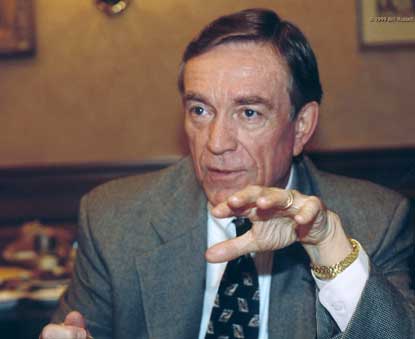 |
|
|
Ray Anderson
... is founder and chairman of Interface, Inc. It is the world’s largest manufacturer of commercial floor coverings, doing business in 110 nations with plants in 6 countries. A pioneering industrialist, Mr. Anderson leads the Next Industrial Revolution toward sustainable (eventually restorative) products and processes. His petrochemical-intensive $1.5B company is profiting from their commitment to zero waste, throughout their supply chain. Mr. Anderson is also Co-chair of the President’s Commission on Sustainable Development. He is author of Mid-Course Correction — Toward a Sustainable Enterprise: The Interface Model. |
|
 3:32 3:32 |
The next industrial revolution will see business and industry leading the environmental cause, Ray Anderson believes. He is convinced we must revolutionize today’s take-make-waste processes and products, move from linear process and products to cyclical ones that mirror nature’s course, create more value from less of the finite earth’s natural capital. Who will lead this revolution? The very corporations and businesses that are today’s greatest environmental offenders. Why? Because there is money to be made doing so. The marketplace will drive business and industry to do the right thing for the planet.
Mr. Anderson is confident that business and industry are THE institutions on earth large enough, powerful enough, wealthy enough and pervasive enough to lead the earth away from that abyss toward which the scientific community assures us we are headed -- global life support systems declining, with the quality of our rivers, oceans, wetlands, lakes, forests, farmlands, rangelands, aquifers, and air all headed in the wrong direction.
Ray Anderson is uniquely qualified to suggest industry and business can get us out of the mess the first industrial revolution has created. Mr. Anderson is the founder, President and Chief Executive Officer of Interface, Inc., now a publicly held company, the world’s largest producer of commercial floor coverings. In just four years, Interface has saved about $80 million simply by eliminating waste. It’s just a beginning but this kind of significant savings will, Mr. Anderson believes, fund his company’s future.
Until 1994, Mr. Anderson was like most other industrialists, content to comply with the law on environmental issues. Then he read Paul Hawken’s book, The Ecology of Commerce. Mr. Anderson was shocked to recognize the culprits hurtling us all toward an environmental cataclysm -- it was himself, Ray Anderson, and people just like him who together comprise business and industry. At the same time Mr. Anderson came to this rude awakening, he also formed a vision of what his company could mature into -- a business that could lead the way toward a Second Industrial Revolution by creating new ways of doing business which would sustain the earth instead of destroying it.
Under Mr. Anderson’s guidance, the people of Interface are now committed to zero waste, sustainability from the well-head and mine all the way to the customer. Then they want to move beyond sustainability (“do no harm to the earth”) to being restorative (“do good for the earth”).
It’s time for a Mid-Course Correction, Mr. Anderson urges, offering the Interface model in his book by the same title. It’s up to all of us, but particularly industry and business, to get us off our current self-destructive path, onto a sustainable course. The time is now. Ray Anderson and Interface are showing the world how. And they’re making money in the process. Spread the word.
[This Program was recorded January 13, 1999, in Atlanta, Georgia, US.]
